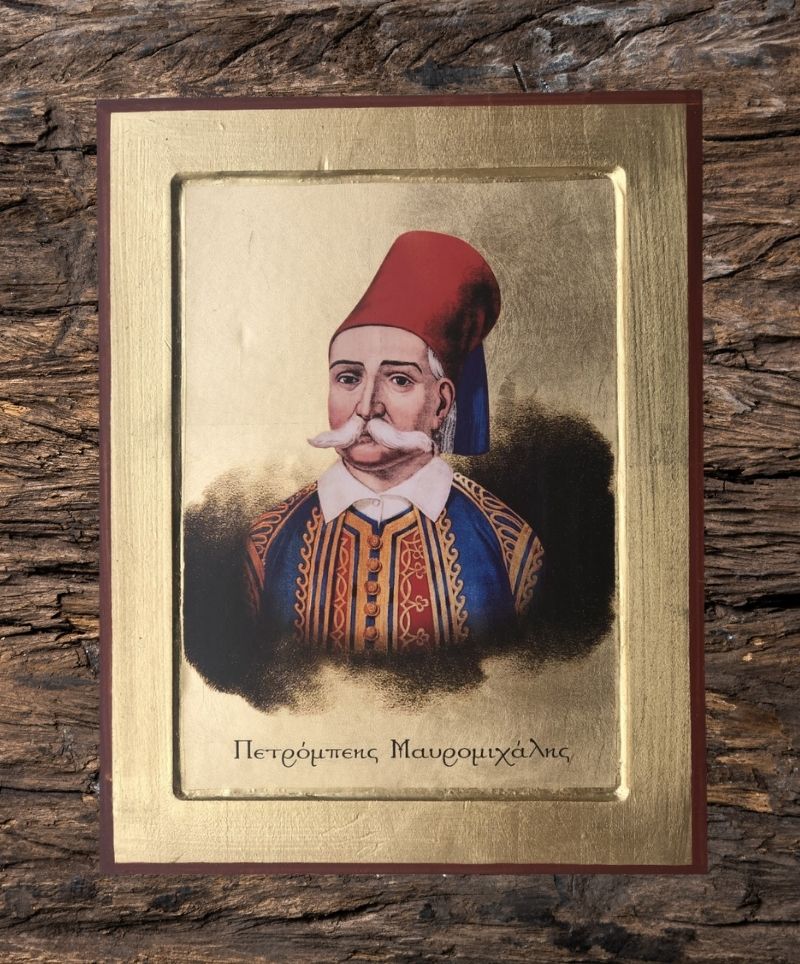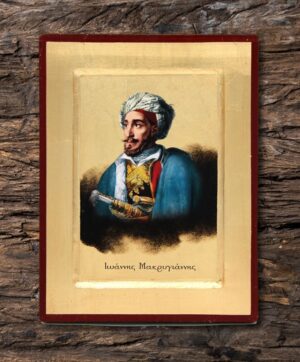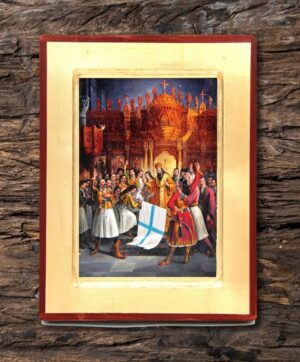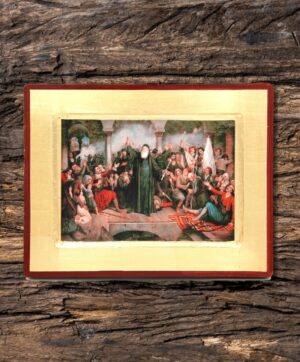Description
At a young age, he married Anna Benaki, daughter of the prefect of Kalamata Panagiotis Benaki, with whom he had six children.
Petrobeis officially took office on June 22, 1816, and set as his primary goal the cessation of civil strife, the restoration of peace and peaceful life and the suppression of piracy.
On August 2, 1818, Mavromichalis was initiated into the Friendly Society in Kitries by the Kalamata merchant Kyriakos Kamarinos, as appears from the list of Friends compiled by Panagiotis Sekeris. According to Sekeris, Petrobeis, in addition to his initial financial contribution, promised to provide “5,000 groschens and twenty thousand armed but poor.”
In January 1821 he began the organizational preparation for the Struggle and agreed with the nobles of Kalamata on the actions that would lead to the liberation of the city. On March 23, with two thousand armed men, he captured Kalamata and drove out the Turkish guard.
On the same day in the liberated city was formed the “Messinian Senate”, the first administrative organization of the revolutionary Hellenism, which immediately addressed the historic proclamation to the European Courts, in which it stated the reasons that led to the Revolution.
After the beginning of the Revolution and until the Assembly of the Kaltezes (May 20-26), of which he was elected president, Petrobeis remained in Messinia. From the summer of 1821, his involvement in political affairs became more intense, while his participation in military operations was remarkable.
After the First National Assembly of Epidaurus (December 20, 1821 – January 16, 1822), he was elected Vice President of the Parliament, President of the Second National Assembly of Astros (April 10-30, 1823), President of the Parliament and Chairman of the Executive Body (10 December 31, 1823).
In the summer of 1822 he fought against Dramalis and in November of the same year he rushed with about 500 Mani to Messolonghi, to prevent the reinforcement of the Turkish forces that were besieging it. During the civil strife (1823-1825) he repeatedly tried to reconcile the warring factions. During the Egyptian invasion of Ibrahim in the Peloponnese (1825) he organized the defence of Mani, which effectively repulsed the enemy attacks.
In April 1826 he was appointed a member of the “Administrative Committee of Greece”, which ruled the revolted Greece until April 1827. He took part in the Third National Assembly of Troizina (March 9 – May 5, 1827, and accepted with relief the election of Kapodistrias, with the belief that discipline would be restored and reconciliation of the warring factions would be achieved.
However, despite the fact that after Kapodistrias’ arrival he was appointed a member of the Presidency of the “Panhellenic” and a member of the Senate, the friendly relations of his family with the Governor of Greece were not maintained for a long time, resulting in his imprisonment.
The assassination of Kapodistrias by his son George and his brother Constantine (September 27, 1831) was the dramatic end of the Kapodistrias-Mavromichalis family opposition. The execution of his son on October 11, 1831, shocked him, as he came to add another dead man to the rest of his family who had fallen heroically on the battlefields.
In March 1832 he was released by order of Augustine Kapodistrias, after the mediation of the German philhellene Friedrich Thiersch. In the period that followed, Petrobeis mediated between the Kapodistrians and the “Constitutionalists” to prevent a new civil war.
During the first period of Otto’s reign, he was appointed vice-president of the Council of State (1835-1843) and after the Revolution of September 3, Plenipotentiary of Zygos (Itilos) in the First National Assembly (1843-1844).
Petros “Petrobeis” Mavromichalis died on January 17, 1848, in Athens and was buried with the honors of a serving lieutenant general.








